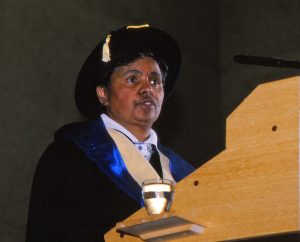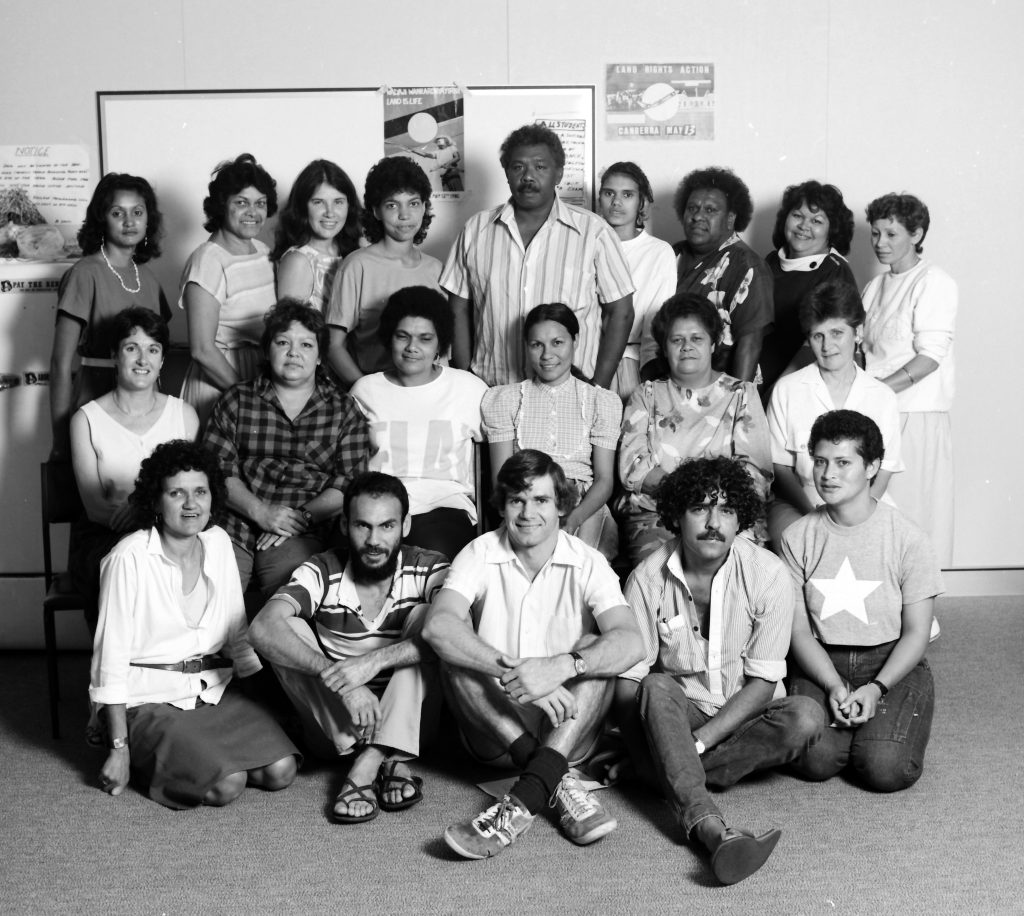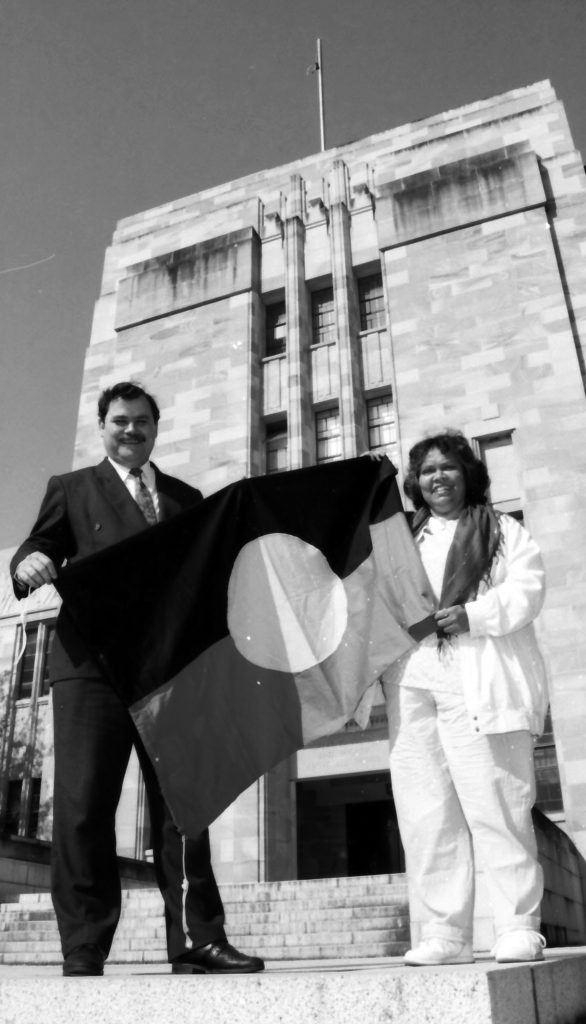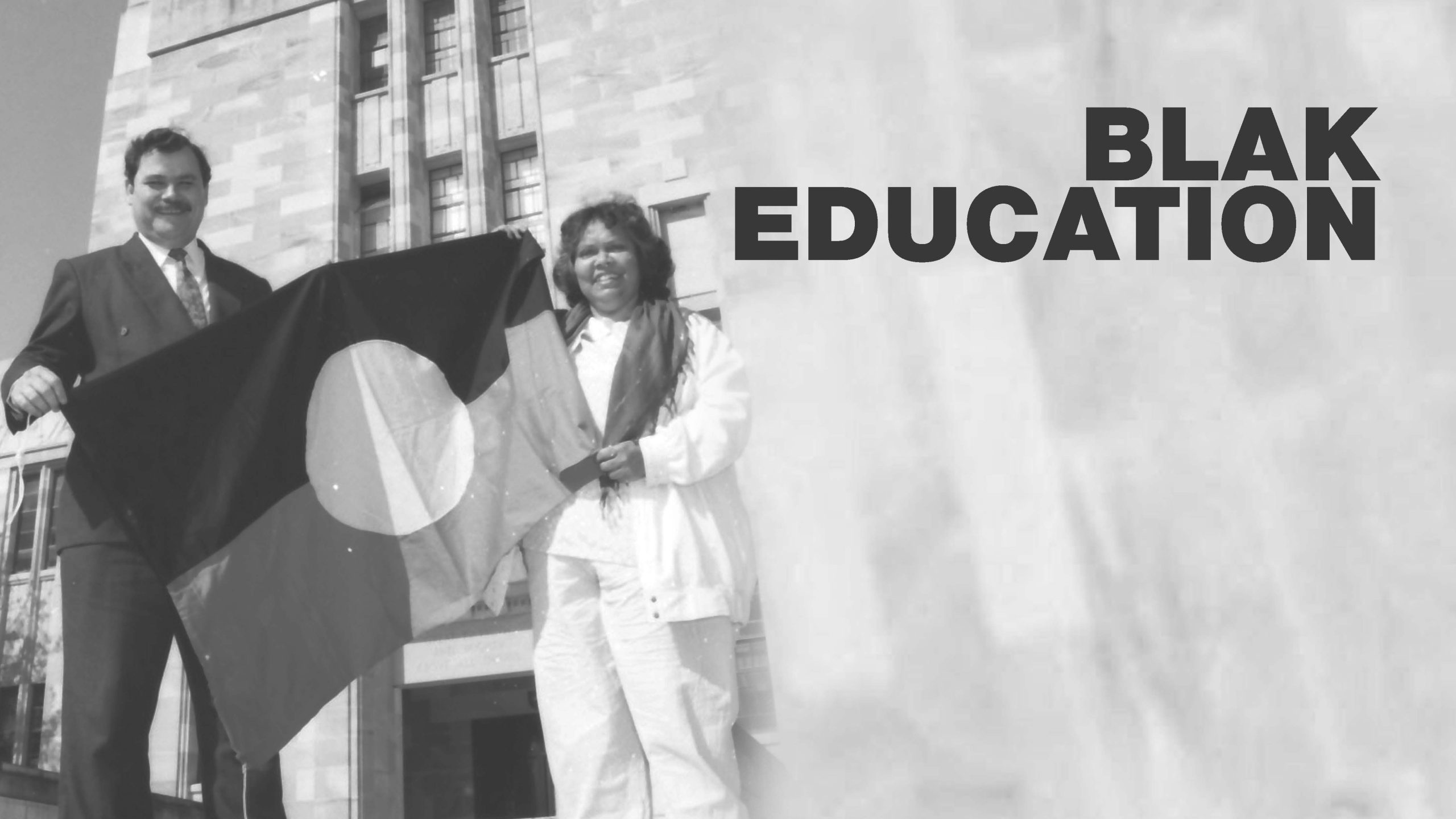Blak Education
Historically, Western concepts of education have been forced upon Aboriginal and Torres Strait Islander peoples. This has perpetuated racism and discrimination against Aboriginal and Torres Strait Islander peoples. This also fails to consider Indigenous ways of knowing, doing and being, which are terms made popular in 2003 by Karen Martin (a Noonuccal woman with ancestral ties to Bidjara land) to articulate Indigenous worldviews.
For millennia, Aboriginal people have learned from and on the lands where UQ now resides. Since the mid-twentieth century, Aboriginal and Torres Strait Islander peoples have continued to learn and grow on these lands as UQ students, graduates, and staff.
In this section of the module, you will learn about how Blak education evolved at UQ.
Indigenous Knowledge
Indigenous knowledge is ongoing, holistic, and comes in a myriad of forms. Historically, Indigenous knowledge and the ways in which Aboriginal and Torres Strait Islander people find, access, and disseminate information has been used to paint us as ‘primitive’ or ‘savage’.
Indigenous knowledge is developed and transmitted in various forms, including storytelling, yarning, dancing and art. Storytelling provides information on social customs and taboos, totemic and kinship structures, Indigenous lore/law, scientific knowledge including medicine and astronomy, sites of significance, and much more. These traditions are often tied to Country or place.
Today, Indigenous knowledge is still accessed and shared widely. For example, researchers at UQ have partnered with the Indjalandji-Dhidhanu people whose Indigenous knowledge of the spinifex crop is aiding in the development of spinifex nanotechnology.
Indigenous knowledge within the university sector serves to strengthen research and validate knowledge, information and data that Aboriginal and Torres Strait Islander peoples have been tapped into for millennia.
Early Students of UQ
The rights and access to education that Aboriginal and Torres Strait Islander peoples have today is thanks to those who came before us. Thanks to the Fryer Library, UQ Archives, the Aboriginal and Torres Strait Islander Services and Collections Team (UQ Library), and the Aboriginal and Torres Strait Islander Studies Unit (ATSISU), information about some of the first known Aboriginal and Torres Strait Islander students at UQ is continuing to be uncovered.
In 1944, the late Joseph Croft (1926-1996) became the first known Indigenous student to enrol at UQ and resided at St John’s College. Though Croft did not graduate from UQ, St John’s College established the Joseph (Joe) Croft Indigenous Award in 2015.
The first known Indigenous graduate at UQ was the late Margaret Valadian (1936-2023) who was awarded a Bachelor of Social Studies on 27 April 1966. Valadian continued to advocate for Aboriginal and Torres Strait Islander peoples’ rights to access education for the remainder of her life. This work was recognised when, in 1995, Macquarie University awarded Dr Valadian with an honorary Doctor of Letters and, in 1996, she was UQ‘s Alumnus of the Year. In 2024, UQ posthumously honoured Dr Valadian with an Honorary Doctorate.

Today, over 1000 Aboriginal and Torres Strait Islander people have graduated UQ and become UQ Alumni, and this number will only continue to grow. It is with great respect that we acknowledge those who came before us and paved the way for Aboriginal and Torres Strait Islander peoples to access education and information resources.
Indigenous Research
Aboriginal and Torres Strait Islander peoples have contributed significantly to research at UQ since the university’s conception. As one of the most researched races in the world, we are often objectified or othered, which has led to distrust and animosity between Indigenous communities and non-Indigenous researchers. Jinibara man, Willie Mackenzie, was the first Indigenous person to be seen as a ‘cultural authority’ at UQ and contributed to the research of Dr Lindsey Winterbotham throughout the 1950s (Anthropology Museum, n.d.).
Toward the latter half of the twentieth century, Aboriginal and Torres Strait Islander peoples began authoring their own research. In 1999, Dr Andrea Lea Crampton was the first known Aboriginal person to graduate with a PhD from UQ. In 2010, Dr Noritta Morseu-Diop became the first known Torres Strait Islander PhD graduate.
Safe Space on Campus
While Aboriginal and Torres Strait Islander peoples have and continue to study and research at UQ, the university has not always been a culturally safe space for many Indigenous peoples. Many Aboriginal and Torres Strait Islander peoples continue to experience varying degrees of racism and discrimination at UQ due to their Indigeneity, which causes distress, harm, and can make studying, researching, and working at UQ very difficult. This is why Aboriginal and Torres Strait Islander controlled and run support services are vital.
In 1984, Aboriginal and Torres Strait Islander Studies Unit (also referred to as the ATSISU and formerly known as the Aboriginal and Islander Studies Unit) was established as a commitment to the teaching, learning, research and cultural needs of Aboriginal and Torres Strait Islander peoples. The first Director was Jeanie Bell, with subsequent Directors including Michael Williams, Dr Jackie Huggins, Kev Carmody, and the late Sam Watson.
Since its establishment in 1984, the ATSISU has continued to support and encourage the celebration of Indigenous cultures, and to recognise the enormous contributions that Aboriginal and Torres Strait Islander people make to UQ.
Welcome to the UQ Aboriginal and Torres Strait Islander Studies Unit (YouTube, 2m 2s):

(back row, left to right) Sarah Tyson, Lynette Van Issum, Christine Morris, Sandra Philips, Mervyn Gibson, Valmae Barney, McRose Elu, Barbara Davis, Bonnie Robertson
(middle row, left to right) Debbie Setterland, Iris Smith Wendy Harold, Valerie Craigie, Barbara Coolwell, Patricia O’Connor
(front row, left to right) Jeanie Bell, Neil Ning, Rod Peckham, Michael Mace, Isobel Mulchay-James
Further, the Indigenous student collective for Aboriginal and Torres Strait Islander students at UQ, Goorie Berrimpa, organise social, sporting and professional events, both on and off campus to encourage a greater awareness of Aboriginal and Torres Strait Islander cultures for both Indigenous and non-Indigenous staff and students.
By forming these coalitions, Aboriginal and Torres Strait Islander peoples have been able to form spaces on and off campus where we can feel supported as we study, research, and work at UQ.
Staffing the University
Many UQ Alumni continued to work within the university after graduation. In 1979, Dr Lilla Watson was the first known Aboriginal tutor at UQ. In 1984, she then began lecturing in UQ’s Department of Social Work. She did all of this while studying for her Bachelor of Arts degree, which she started in 1973 and completed in 1987. In 2020, Dr Watson was awarded a Doctor of The University honoris causa.

Dr Mary Graham, alongside Dr Lilla Watson, was instrumental in the development and teaching of the first Indigenous-led course relating to Aboriginal and Torres Strait Islander studies. These courses were built into the Australian BlackCard cultural competency program, of which Dr Graham was a founding director. In 2023, Dr Mary Graham was awarded an Honorary Doctorate.
In 1987, Dr Jackie Huggins graduated with a Bachelor of Arts and, in 2006, she was awarded a Doctor of The University honoris causa. In 1997, Dr Huggins worked at UQ as the Director of the Aboriginal and Torres Strait Islander Studies Unit.
The manuscript collections of both Dr Watson (UQFL576 Lilla Watson Papers) and Dr Huggins (UQFL468 Jackie Huggins Collection) are housed within the Fryer Library at UQ’s St Lucia campus. These collections delve into the impact and legacy these two women continue to have on education at a local and national level. More on the Fryer Library can be found in the Collections section of this module.
Blak literature
UQ has strong relationships with Aboriginal and Torres Strait Islander authors, Australian publishers, and organisations dedicated to Indigenous literature and storytelling.
The full name of the Fryer Library, located on our St Lucia campus, is the Fryer Memorial Library of Australian Literature. Established in 1927 and named in memory of UQ student, John Denis Fryer, this library is the custodian of collections by prominent Indigenous authors including Oodgeroo Noonuccal, Herb Wharton, Melissa Lucashenko, Dr Jackie Huggins, and more.
The university is home to one of Australia’s leading publishers, the University of Queensland Press (UQP). Established in 1948, UQP continues to publish Aboriginal and Torres Strait Islander authors. In 1988, they established the David Unaipon Award, Australia’s most prestigious award for unpublished Indigenous authors. Since 2023, they are the publishers of the First Nations Classics series, a catalogue of books by Aboriginal and Torres Strait Islander authors that have been reprinted to enhance awareness of Blak literature and revitalise older stories for newer audiences.
UQ is also the home of AustLit, a bio-bibliographical database of Australian literature and storytelling. 2007. AustLit’s biggest and most significant dataset, BlackWords, serves as a useful repository for information about the lives, careers, and works of Aboriginal and Torres Strait Islander writers and storytellers and the literary cultures and traditions that formed and influenced them. Launched by the late Sam Watson in 2007, BlackWords now has over 27,000 work records and more than 7,000 author or organisation records, with over 1800 works in Indigenous languages.
Though housed and maintained at UQ, BlackWords began as a collaboration between multiple institutions and has had numerous supporters over the years, including its first coordinator and ongoing champion Professor Anita Heiss, as well as Professor Tracey Bunda and Dr Jackie Huggins. In 2024, Dr Melanie Saward took over as the BlackWords coordinator. For more information, visit the AustLit website.
Video overview of this chapter – UQ has a Blak history – Blak Education (YouTube, 3m 29s):
References and Resources
Croft, B. L. (n.d.) Joseph (Joe) Croft (c. 1925–1996). Australian Dictionary of Biography. https://adb.anu.edu.au/biography/croft-joseph-joe-32006
Martin, K. (2003). Ways of knowing, being and doing: A theoretical framework and methods for indigenous and indigenist re‐search. Journal of Australian Studies, 27(76), 203-214. https://doi.org/10.1080/14443050309387838
UQ Alumni and Community. (n.d.) Dr Lilla Watson. https://alumni.uq.edu.au/story/6819/dr-lilla-watson
UQ Anthropology Museum. (n.d.) From Relics to Rights: Aboriginal People and Anthropology at the University of Queensland. https://anthropologymuseum.uq.edu.au/exhibitions/past-exhibitions/relics-rights-aboriginal-people-and-anthropology-university-queensland
UQ Indigenous Engagement. (n.d.). Goorie Berrimpa student collective. https://indigenous-engagement.uq.edu.au/current-students/goorie-berrimpa-student-collective
UQ News. (2024, 10 July). Great Court carving announced as UQ confers honours. https://www.uq.edu.au/news/article/2024/07/great-court-carving-announced-uq-confers-honours


